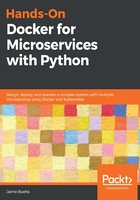
Producing automated builds
The core element in CI is generating automated builds integrated with a source control system. A software build is a process that (starting from the source code) performs a series of actions and produces an output. If the project is written in a compiled language, the output will typically be the compiled program.
If we want to have quality software, then part of the build involves checking that the produced code follows code standards. If the code doesn't follow those standards, then the build will return an error.
Some examples of steps that can be a part of the build are as follows:
- Compiling the code.
- Running unit tests
- Running static code analysis tools
- Building one or more containers
- Checking dependencies for known vulnerabilities with a tool such as Safety (https://pyup.io/safety/)
- Generating a binary or source package for distribution. For example, RPM (https://rpm.org/), Debian packages (https://www.debian.org/doc/manuals/debian-faq/ch-pkg_basics), and so on
- Running other kinds of tests
- Generating reports, diagrams, or other assets from the code
Anything that can run automatically can be a part of a build. A local build can be generated at any time, even with code that's still in progress. This is important for debugging and solving issues. But automated builds will run against each individual commit, and not at any intermediate stage. This makes it very explicit to check what code is expected to run in production and what code is still work in progress.
Running the build for each commit detects problems very quickly. If commits are small, a breaking change is easy to pinpoint. It also makes it easy to revert changes that break the build and go back to known working code.